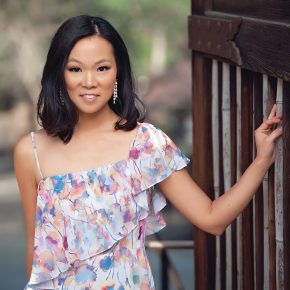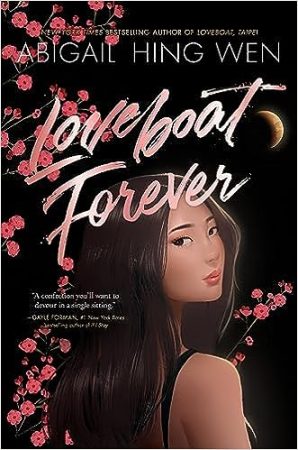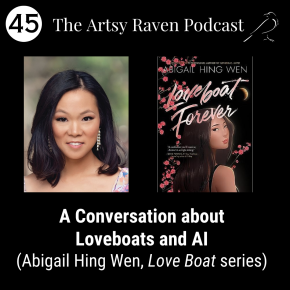Abigail Hing Wen is the New York Times bestselling author of Loveboat, Taipei, which is being adapted for film. She holds a BA from Harvard, a JD from Columbia Law School, and an MFA from the Vermont School of Fine Arts, and, like some of her characters, is obsessed with musicals and dancing. When she’s not writing stories or listening to her favourite scores, she is busy working in artificial intelligence in Silicon Valley, where she lives with her family.
Recently, Ricepaper Deputy Editor JF Garrard caught up with her to ask her about the Loveboat series and was surprised to find out they both attended Loveboat in Taiwan!
JF Garrard (JFG): Welcome! Can you tell me a little bit about yourself and why you started writing?

Abigail Hing Wen
Photo by Olga Pichkova of IOPhotoStudio
Abigail Hing Wen (AHW): Well, it’s something I didn’t realize I had in me until I looked back, but I’ve always loved stories. I was a big reader growing up as a child. I grew up in Ohio where it was quite lonely at times. I found my friends in the many books that I read. I read a lot of Laura Ingalls and the Chronicles of Narnia and of course, when Harry Potter came out, I fell in love with that series too. Throughout my school life, through college, through law school, every time there was an open-ended assignment, I would take the opportunity to write a short story.
But I didn’t know I was a writer for many years. Even after that, it just felt like I never read any authors who looked like me or who wrote about things that I experienced. It just didn’t seem like something that was a possibility for me, but I did begin my first novel about 16 years ago.
I had this idea swimming around in my head, about a fantasy novel of a boy going to another world. I was thinking about being a law professor, but I was just not excited about that path, even though I’d done everything to get there. One day my husband said, you’re so excited about this story, why don’t you just try it? In retrospect, that was actually a really big deal that he told me to just try it because it’s kind of like, well, why don’t you just go build that rocket ship to Mars? That’s how big it felt. But I did try it and it just came pouring out of me.
JFG: Do you write mostly romance? Your Loveboat title is a whole series of books, but do you also write other genres?
AHW: I actually write very widely. I write legal articles and my first novel was actually a middle-grade high fantasy. Then I wrote a thriller set abroad as my second book. But I didn’t know that I could write romance. This just started to evolve in my writing. I used to care a lot about relationships when I was growing up and I would talk a lot about it with my friends. I think maybe I gleaned it from all of that. However, I think more than anything, it’s a skill to learn how to write romance and I had some really wonderful mentors along the way.
JFG: How did you start publishing?
AHW: It was a long process for me. I actually wrote four novels on the way to Loveboat Taipei, which is my fifth novel and I had to bury all the other ones. I sent each novel out into the world to agents. I got rejected multiple times, many, many times along the way. I did get an agent with my second novel, and we came close at a publishing house, but it was before Crazy Rich Asians and Hamilton opened up the world for diverse stories to have general audiences. So the marketing team said they didn’t know how to market the book and it fell through. Then the same thing happened in my third novel, which was read overnight by an editor but couldn’t get through marketing. In the fourth novel, I actually didn’t even make it out there because my agent at the time didn’t want to try. Finally, my fifth novel was rejected, Loveboat Taipei. It got rejected at version twenty-six, and at that point, I had no idea how to make things happen. But everything kind of turned around shortly after that. I ended up publishing Loveboat Taipei at draft thirty-one. It went to auction at the publishing houses, and then it came out. The really short answer is it’s a lot of perseverance and just you keep going.
JFG: Yes, it sounds like a lot of rejection. How do you handle this? You fell down, but you got back up each time.
AHW: I did. It’s the community that kept me going. I have wonderful critique partners who told me, “Your stuff is really good.” There are systemic reasons why you’re not getting through the gates, and you just gotta keep going, and just get good advice from good writers. I picked up so many tips along the way. I actually have written about some of them. I think they may be on my website or somewhere out there.
JFG: What things did you do to sort of make yourself better for the next book as you went along?
 AHW: Yes, it was incremental. Initially, I wrote that first novel all by myself. My husband kept telling me, you need to show it to someone to get feedback. I said, no, no, I can’t show it to anyone. Now I’m the reverse! I show things very early. My motto is to fail fast. I want to just find out in that interim period. I took classes online. I went to conferences. I got critiques from editors. I was working with an agent on my manuscript, but, I realized I needed to go deeper, and so I did end up deciding to get my MFA, and that’s when I went to Vermont College of Fine Arts which is a distance program. I was working at the same time, and basically during my vacation time. My earnings from my job went to the MFA program. It was the hardest decision, to invest in myself at that point.
AHW: Yes, it was incremental. Initially, I wrote that first novel all by myself. My husband kept telling me, you need to show it to someone to get feedback. I said, no, no, I can’t show it to anyone. Now I’m the reverse! I show things very early. My motto is to fail fast. I want to just find out in that interim period. I took classes online. I went to conferences. I got critiques from editors. I was working with an agent on my manuscript, but, I realized I needed to go deeper, and so I did end up deciding to get my MFA, and that’s when I went to Vermont College of Fine Arts which is a distance program. I was working at the same time, and basically during my vacation time. My earnings from my job went to the MFA program. It was the hardest decision, to invest in myself at that point.
I remember one of my classmates was really insecure about being there. We asked questions: Are we spending a lot of money to chase Bigfoot? You have no idea if this is going to pay out or not. But then I would speak to other writers, and they said, you know, it’s an investment in yourself and for them, it had paid off. For me, it has paid off incredibly and I’ve made back all the money that I spent and more.
JFG: What inspires you to write the stories you’re writing?
AHW: I draw from all over. Loveboat Taipei, Loveboat Reunion and Loveboat Forever, which are the sequels, were inspired by this trip that I took as an 18-year-old myself. I went to Taipei to learn language and culture and I discovered it turned out to be the summer free-for-all all, nicknamed “Loveboat.”
JFG: Wow, I was on the same trip!
AHW: What year did you go?
JFG: Two thousand something something. I don’t even remember. It was so long ago, but I remember there were Chinese people from everywhere, Japan, Europe, USA.
AHW: It was such an eye-opening experience because of the experience is meeting similar Asian Americans, Asian French people, and Asian Australians with all the diaspora immigrant experience of being displaced, but also having these ties back to Asia.
It was just amazing. Asian diaspora, they’re just so proud of their culture. I did reconnect with my heritage and was able to draw strength from that. So that’s the inspiration behind the Loveboat series and other books draw on various other aspects of my life.
I have neuro-diverse characters with different learning differences. Mental health issues. I have a couple of stories set in Silicon Valley. We just announced my fourth novel with Macmillan, Kisses, Codes, and Conspiracies. And that’s following Tan Lee on an adventure through, through San Francisco Bay area with thugs on his heels, who are after his ex-girlfriend from Shanghai.
I draw from all aspects of my life, to create fun stories that also explore deeper themes of identity and belonging and family and, calling, like a personal calling.
JFG: I think it’s really awesome that you’ve had success in a variety of genres with romance, young adult, thrillers and fantasy. In the near future, we’ll see much more books that have more Asian characters, because growing up, I didn’t really see much of that.
AHW: No, that’s true for me. I think that’s why I just didn’t know I could be a writer for so many years. I just didn’t see anybody doing that. Initially, I told my mom I wanted to be an artist. She told me I couldn’t become an artist, you can’t make any money.
The other thing I wanted to be was a farmer’s wife. My mom said that was a really hard life.
JFG: Oh definitely, my grandma had a farming life. Well, she did live to 105, but it is a tough life. She got mad at us when we bought rice because it was so easy, we didn’t have to plant or harvest the crop. It was a very different life for her when she was young.
AHW: Yeah, I’m doing everything now, which has been so fun. I left my corporate job in venture capital and artificial intelligence in Silicon Valley two years ago to do the creative work full-time. I’m writing novels. I’m also working on some original TV and film projects as a producer and screenwriter.
I would love to move into directing that’s further down the line. At the moment I have twelve projects I’m just moving forward simultaneously. There’s the three Loveboat books, the novel coming from Macmillan, and then I have two more novels in the pipeline along with like the rest of my portfolio.
JFG: With AI, it’s very interesting because right now, people view it as a competition with writers. What do you think of this?
AHW: I think writers and all creatives need to be in charge of their own AI derivatives, which are things that are derived from their works. I’ve heard about actors getting body scanned and they should own those body scans, right? They should own the rights to those and be able to license them or not if they want to, and the same with writers and creatives to the extent AI is being used to model work, so people should be able to own the work. If a writer wrote a script and AI is used to punch it up, that’s the writer’s script, right?
This means creative people need to be educated about what AI can and can’t do. I do think it is still in the early stages. and that what AI creates is not the good stuff. It’s the average stuff. I think of it in the same way of cameras changing the world of portrait painting, but also spawning a whole new industry.
Creatives can take advantage of this new technology to grow their creative careers.
JFG: Yes, definitely. It’s a genie that’s come out and people have to figure out what to do, similar to the internet and so it’ll be interesting to see in the next few years, to see where things go, but I think copyright will always be a challenge.
Interesting you talk about directing. It sounds like you’re building an empire!
AHW: I’m just having a lot of fun. I am building. I’m growing. I’m finding more and more partners for everything that I’m working on. This has been really exciting.
JFG: This all sounds super awesome. Thank you so much for your time!
- This is a condensed version of an Artsy Raven podcast episode #45. On the podcast, Abigail does a reading from Loveboat Forever, Chapter 1. Click to listen on Spotify or YouTube.
- Her author website is abigailhingwen.com
